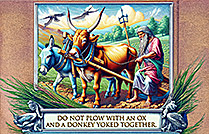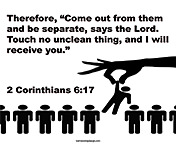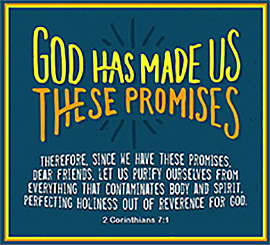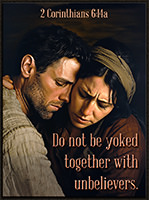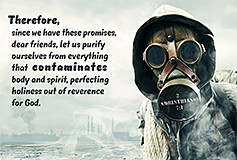Second Corinthians 6:14–7:1 . . .
Bonding with Unbelievers
Jesus instructs believers to “Love the Lord your God with all your heart and with all your soul and with all your mind” (Matthew 22:37 NIV). It’s because God the Provider has already loved us and displayed true love in his care by supplying food, shelter, clothing, family, friends, and all the richness of life. In our salvation he’ll provide the lifting of the awful sense of guilt and rejection, giving us a sense of worth. He gives believers a sense of belonging to a family, of having a purpose for life. All those are gifts of love; therefore, we believers are to respond continually; as we respond more and more, we experience more of the same.
This is what concerns Paul in today’s passage. But, in last week’s summary of 6:3–13, we learned that he urged the Corinthians, in effect, to Open up, communicate, show acceptance and love. It’s basic to everything. Do you see Problem #1 therein? If you don’t respond to love, then you shouldn’t wonder if, why, or how your life remains cold, barren, lonely, empty, and meaningless. When you’re loved, you should deliberately love back. Doing so, your life will begin to expand.
Let’s look at this week’s Problem #2 (shown in vv. 14–16 at the bottom of the page). The majority of believers face obstacles that hinder their “ministry of reconciliation” (defined here). One obstacle is restricted affections: holding ourselves back and remaining private when we have opportunities to use our giftedness to lovingly serve the Lord.
Another obstacle that rears its ugly head involves the nature of our relationships with unbelievers. Such relationships or associations often limit us, keeping us from acting as we ought to act. Paul clearly warns believers, “Do not be yoked together with unbelievers.” A yoke is a wooden frame or bar with loops at each end, fitted around the necks of two animals, tying them together, forcing them to function as one. Paul references Deuteronomy 22:10, wherein the Law says, “Do not yoke together an ox and an ass….” That concept might seem strange to us, but God was concerned that they not tie together two animals of a different nature or quality. Yoked together, the weaker or shorter animal would walk slower than the taller, stronger one, causing the load to veer off track. When oxen are unequally yoked, they cannot effectively perform the task set before them. Instead of working together, they’re at odds with one another.
This is what the Law reflects. It’s a cruel thing to yoke together two things of incompatible natures. What Paul’s saying is that there are certain associations that Christians have with unbelievers that constitute a yoke; such associations are a certain cause for misery and shame in a Christian’s life, and are to be avoided. In vv. 15–16a, Paul lists overt pairs of incompatibles to emphasize his heartfelt warning to fellow believers. Included is his rhetorical question: “What harmony is there between Christ and Belial?” There is no harmony between Christ and Belial! Here’s why.
The in vv. 17–18, Paul gathers together and quotes a group of texts from various parts of Scripture. His focus returns to his “reciprocity of love” theme. In effect, our loving God is saying to us: Look, I’m here to enrich you; I want to make you my royal son and daughter; I want to be a tender, loving, careful, concerned, powerful Father to you; but I can’t do it while you’re still giving all your affection and all your ties to something or someone else. Therefore, break that yoke! That way you might experience the richness of God.
Note the loving atmosphere in which this passage is set. It’s part of Paul’s description of the “ministry of reconciliation” (5:18). We’re all called to be “ambassadors for Christ” (5:20), offering men and women reconciliation with God, reminding them that Father God isn’t angry with them because of their sins, but he urges them to turn to him that he might heal and restore them in his love.
As highlighted in the opening paragraphs above, and in last week’s study, in order for you to enjoy love, you must respond to it. But you’ll be unable to respond to love if you’re clinging to an entity of a different nature that’s going in another direction. Note: Though God’s love is waiting to bless you, you’re unable to feel and enjoy it until you separate yourself from the yoke(s) that binds you.
Of course, the closest alliance one person can have with another is found in marriage. God’s plan is for a man and a woman to become “one flesh” (Genesis 2:24), a relationship so intimate that one person literally and figuratively becomes united with the other. Uniting a believer with an unbeliever is essentially uniting opposites, which makes for a very difficult relationship.
Paul makes his final appeal to the Corinthians and each of us, in v. 7:1, which is worth highlighting:
“Therefore, since we have these promises, dear friends, let us purify ourselves from everything that contaminates body and spirit, perfecting holiness out of reverence for God.”
So: Who’s it up to? It’s up to you, isn’t it? Cleanse yourself by breaking all constraining yokes in your life. If you’re tied to a friendship or relationship that’s impeding your Christian walk and your dedicated service to the Lord, then you must break it and give it up.
Please don’t misread that warning. Many people mistakenly think that it means this: If you turn away from all the unclean things in life, giving up those ugly, dirty things you may have stumbled upon, you’re then making yourself holy. Sorry, but that’s not the approach to take. Holiness is a gift that God gives you at the beginning of your Christian life. As Romans 12:1b instructs us, “… offer your bodies as a living sacrifice, [already] holy and pleasing to God — this is your true and proper worship.” It was God who already made you holy. You’re not to try to become holy; you’re already holy, which is the point. But that holiness is to be perfected, made visible by your acting like the Christian believer who you’ve become, one who is and remains the dwelling place of God. That’s the appeal that Apostle Paul makes here.
What a loving appeal that is, that we free ourselves from all those limiting, restricting, binding relationships that we find ourselves in. Once freed, we’re able to become the men and women who God has called us to be. And that’s what this world is waiting to see.
Note: 2nd Corinthians encourages believers to embrace and follow the way of Jesus that transforms lives and values generosity, humility, and weakness. In chapters 1–3, Paul presents these four elements:
Treasure in fragile clay jars (ch. 4) | Old tent, new bodies (ch. 5)
God’s timely grace (ch. 6) | Godly sorrow, joyful reconciliation (ch. 7)
› Watch BibleProject’s superb animated video (2 minutes) that highlights Paul’s messages in these four chapters.
† Summary of 2 Corinthians 6:14–7:1
In this brief, six-verse passage, Paul addresses the Corinthian church with a call for separation and holiness. The main points of his passage are:
1) Avoiding unequal partnerships: Paul urges believers to not be “unequally yoked” with unbelievers. This metaphor, derived from Deuteronomy 22:10, emphasizes the incompatibility between believers and unbelievers in close relationships.
2) Contrasting righteousness and unrighteousness: He uses a series of rhetorical questions to highlight the fundamental differences between believers and unbelievers, comparing light with darkness, Christ with Belial, and God’s temple with idols.
3) The identity of believers as God’s temple: Paul reminds the Corinthians that they’re the temple of the living God, quoting Old Testament scriptures to emphasize God’s promise to dwell among his people.
4) Call for separation: Based on their identity as God’s people, Paul exhorts the Corinthians to “come out from them and be separate” and to avoid touching unclean things.
5) Promise of divine relationship: Paul concludes with God’s promise to be a Father to those who separate themselves, emphasizing the familial relationship between God and his people.
This passage emphasizes the need for believers to maintain their distinct identity in Christ, avoiding compromising relationships or practices that could hinder their spiritual growth and relationship with God.
- Q. 1 How should we apply Paul’s teaching on being “unequally yoked” in our modern context?
- Q. 2 What’s necessary if you want God to become your Father (vv. 16–18)?
- Q. 3 What does this imply about choosing a spouse?
- Q. 4 Can a believer become a friend and witness to an unbeliever without becoming “yoked”?
2 Corinthians 6:14–7:1
New International Version (NIV)
[You can view it in a different version by clicking here; you can also listen to chapter 6.]
Warning Against Idolatry… Read The Message version of this short passage.
14Do not be yoked together with unbelievers. For what do righteousness and wickedness have in common? Or what fellowship can light have with darkness? 15What harmony is there between Christ and Belial? Or what does a believer have in common with an unbeliever? 16What agreement is there between the temple of God and idols? For we are the temple of the living God. As God has said:
“I will live with them and walk among them, and I will be their God, and they will be my people.”
17Therefore, “Come out from them and be separate, says the Lord. Touch no unclean thing, and I will receive you.”
18And, “I will be a Father to you, and you will be my sons and daughters, says the Lord Almighty.”
7 1Therefore, since we have these promises, dear friends, let us purify ourselves from everything that contaminates body and spirit, perfecting holiness out of reverence for God.
